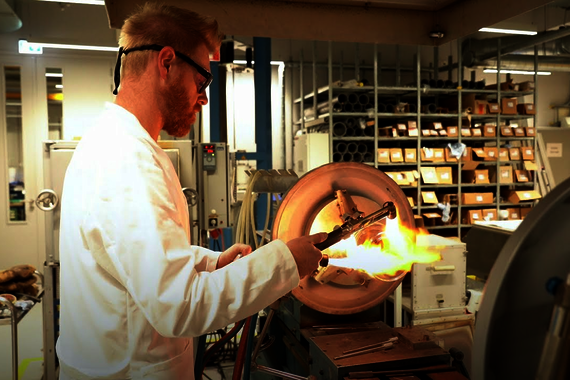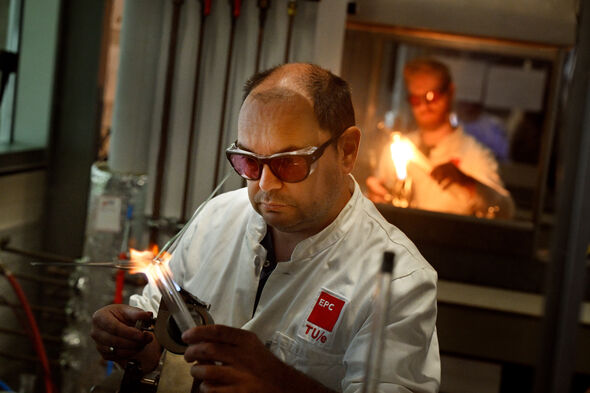
Behind the Scenes | Bart and Bart, glassblowers
"Glass is a fascinating material"
Keeping a university running is no easy feat. It takes a lot of hands to make sure everything is in order, from administration to cleaning and from security to technical maintenance. Who are the unsung heroes behind the scenes keeping everything on track? In this series, Cursor shines the spotlight on TU/e employees. Today: Bart & Bart, our in-house glassblowers.
Glassblowers? Yes, glassblowers! Right here on campus. Bart Huysmans and Bart Lommelen have known each other for over 25 years. They live in the same village, studied the same discipline and now work together almost every day in the glassblowing workshop at the Matrix building. And they wouldn’t have it any other way, because according to them, a university is “the best place to work as a glassblower.”
What time do you clock in?
Lommelen: “We have to be here by nine in the morning at the latest, but usually we try to be here by 7:15 AM. Just so we’re ahead of traffic and can get home a bit quicker. Because we both live in Belgium, in Mol. That’s about a 55-minute drive.”
Huysmans: “If you start early, you get to go home early!”
What led you to this job?
Lommelen: “There is a training program in Mol, specifically to master the craft of glass instrument making. Whereas some people choose to study metalworking or woodworking, we studied glassworking. Glass is just a fascinating material. Something unique that not many people work with and that’s what appealed to me.”
Huysmans: “It’s exactly the same for me. It was love at first sight.”
How did you end up at TU/e?
Huysmans: “I had been working at Louwers (glass and ceramics manufacturer, Ed.) for about 16 years when an acquaintance contacted me and said ‘There’s a great job for you here at TU/e’. And now I’ve been working here for over seven years.”
Lommelen: “I’ve been working here for a little over two years now. We had first worked together at Louwers. And seeing as someone was retiring here at TU/e, a vacancy became available. So Bart called me immediately. The world of glassblowing is very small. There are not that many glass instrument makers, so everyone in the field knows each other and when a spot opens up, word travels quickly.”
What does your day look like?
Huysmans: “The first thing we usually do is open the furnace. The products we made the day before are tempered in the furnace and then we lay them out for people to pick up.
The next thing we do is see what work is in store for us that day and divide it among ourselves, based on what we feel like doing. We never know in advance what we’ll be working on. We get new customers that bring new challenges and new work every day. They just walk in.”
Lommelen: “Mostly from the chemistry and physics departments. Those are our biggest customers. Students and researchers who can’t find something online come to us to have it custom-made. We specify everything we can do and then we come to an agreement. It usually works out very well. In fact, we manage to make pretty much everything that’s requested.”
Huysmans: “Not always on the first try, but in the end, we get almost everything made.”
How many products do you make in a week?
Huysmans: “That depends on the product. If it’s something large, we may well spend three whole days working on one thing. Those are often big items, with spirals and fusions, and they have to be put in the furnace in between to be tempered. If it’s little things, we can make at least 500 a week.”
Lommelen: “It also kind of depends on the time of year.”
Huysmans: “Just before the vacations, we get a lot of repair work. These are often coolers, or other things students have broken, which we then try to fix before the vacation is over and classes start again.”
What is the best part of this job?
Huysmans: “We get to make the most beautiful things here.”
Lommelen: “For a glass instrument maker, a university is probably the best place to let your skills shine. And to see how far we can go; test the limits of what we can do. That’s what makes this job so great.”
And the least enjoyable part?
Huysmans: “There are times when there’s not as much work to do. But then we try to stay busy and improve our skills.”
Lommelen: “Adjusting machines, ordering materials, and discussing what can be done differently or better. So we usually manage to fill those quiet periods.”
What are you most proud of?
Huysmans: “We try to be proud of each and every one of our products. We truly strive to make everything as beautiful as possible, so that every customer who walks in here leaves satisfied.”
What time do you clock out?
Lommelen: “Since we usually start early, we’re here until about 4 PM.”
What do you do off the clock?
Lommelen: “I spend most of my time trying to be an awesome dad and a good partner to my wife. The kids have hobbies, so we make time for those, and on top of that, we try to enjoy life ourselves.”
Huysmans: “I also put the family first, of course. Besides that, I love making music. I play the trumpet which I put a lot of time into. I’m always up for some trumpeting.”
Call to action: “We can make anything you need!”
Bart and Bart feel like not everyone is aware that there is a glassblowing workshop on campus. That is why they would like to conclude this interview with a call to anyone in need of glasswork. “Come to us for all your glasswork needs! From ready-made items to custom creations.”
For questions, you can simply walk into the glass workshop (Matrix 0.212A), call (040 - 247 2972) or send an email (r.j.l.j.d.regt@tue.nl).



Discussion